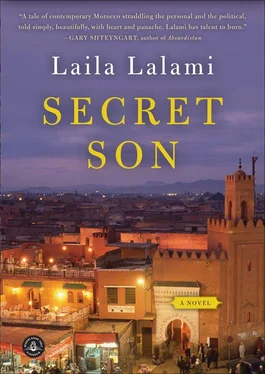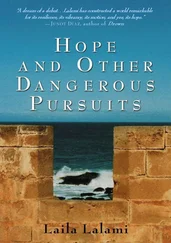Then Palestine: people waiting in line for food in Gaza, families walking single file down a rocky hill in order to get to a checkpoint, the burial of a twenty-day-old baby with a gunshot wound to the head, an officer slapping a toothless old man in the West Bank. The images were no different from those shown on any given day on twenty-four-hour news channels, and usually they would have stirred feelings of anger in Youssef. Today, though, the anger was already there, and the images merely sharpened it.
The last series of photographs were from Iraq. Men, naked and barefoot, without faces or names, their hands cuffed to beds, rails, and doors, standing in their own urine or sitting in their own feces. Their heads were covered with black sandbags or with pink, frilly women’s underwear. One stood on a box, wires taped to his hands, his arms spread out in a crucificial pose. Another was made to bend, as if he were in ruku‘, while a soldier sat on a chair in front of him. Men were piled like stones in pyramids of varying heights or dragged on a leash like animals.
The horror gave rise to fury, and suddenly Youssef felt unable to decide what to do with himself. Cry out in pain or stay quiet? Stay here in this musty office or run as far away from it as possible? He put his fingers on his temples, trying to follow each thought to its conclusion, but each one vanished before he could.
“The point that Brother Moussa is trying to make,” Hatim said, “is that our stories are the same. We get injustice, repression, and torture, and somehow we’re supposed to stay quiet? To say please and thank you?” He shook his head. “Not us. We say no.”
Youssef had walked into that office preoccupied only by his own troubles, but after hearing Hatim’s words and seeing Moussa’s pictures, he felt as though he were losing touch with himself, becoming part of something much bigger. The injustice he had suffered was small and insignificant compared with these others, yet they were all made of the same fabric, the same disregard for human dignity.
“Everyone knows we are at war,” Hatim continued, “but the Party doesn’t fight the war with the same weapons. Some people think that strapping themselves up with explosives and killing fifty people is a good way to win, but I think that’s inefficient, not to mention outdated. Any fool can blow himself up. A smart man has to worry about winning the image war, too. We want to hit very specific targets that will have maximum effect. This is why we set our minds on Farid Benaboud — you remember him, I’m sure. He wrote the first article denouncing our work here, and of course many of his colleagues have since followed him, like the Ben Oui-Ouis that they are. In the past, he has defended the whores who were caught with foreign tourists and has even suggested we must stop teaching religion in schools. Enough, I say. It is time we send a message to him and to those of his kind, to let them know we will not be intimidated, that we will continue our work regardless of their efforts to stop us. Imagine what eliminating him will do to the rest of his useless class of writers and journalists! The time has come for an operation against him.”
“An operation?” Youssef repeated. The radiating star inside him numbed all other senses, so that his own voice sounded faint, as if it came from a faraway place and not from his own mouth.
Hatim placed his fingertips together in a steeple. “Nabil Amrani owns the Grand Hotel, which we have been monitoring for quite a while now. You are familiar with it since you worked there for a year. It is a place of filth and sin, so it is perhaps fitting that it turned out to be Farid Benaboud’s favorite place to get a drink. We will conduct the operation there, so we can strike two birds with one stone.” Now Hatim picked up the silver paperweight and turned it around in his hand. “My son, I think you know where I am going with this. You have been chosen for this operation — a great honor for you and your mother. Your people’s future is on your shoulders. The question is, What will you do? How will you choose?”
“But why Benaboud?” Youssef managed to say. “He doesn’t deserve this.”
Hatim chuckled with incredulity. “So you think he is innocent? What about you? Are you not innocent? Do you think that you deserved what happened to you?”
Youssef drew his breath, but he had no response to that question. He was innocent. What had he done? He had been condemned to a life of poverty and alienness, and those who had pronounced the sentence were not even aware of his existence. Why should innocence belong only to those on the other side?
Hatim raised his eyebrows. “My son, think of this as a big play. We all have a part in it. Your mother. Nabil Amrani. Farid Benaboud. Me. You. All the actors have taken their places, and now it is your turn. Will you do it?”
Youssef had not thought there could be a way out of the labyrinth of words; his anger had imprisoned him there, but now Hatim was leading him to the exit. He was at once exhausted and relieved to see it. “Yes,” he whispered. “I will do it.”
Hatim exchanged glances with Moussa, who left the room at once, closing the door behind him. “I always thought you were smart, Youssef. You have not disappointed me. Now, listen to me carefully. We’ll set up a meeting with Benaboud at the Grand Hotel, and we’ll drive you there on the appointed day. Your job is to slit his throat. It’s not as hard as it sounds. Have you ever slaughtered a chicken or a sheep? It’s not that different. All you have to do is aim for the jugular vein, right here”—he pointed to his neck—“and make a neat, unhesitating cut. It’s quick and effective. He will barely feel anything.”
From a desk drawer, he pulled out a knife so small it could easily be hidden in a sock. He demonstrated its sharpness by running its tip against a piece of paper, cutting it neatly in half, then gave it to Youssef to hold in his hand. Until this moment, Hatim’s proposal had remained theoretical, maybe even hypothetical, but the cold knife in Youssef’s hand turned the theory into practice, and the plan into plot.
“After you complete your mission, I want you to leave the hotel through the back doors, where the car will be waiting for you. Do you understand me?”
“But people will see me. They’ll recognize me.”
“They won’t,” Hatim said, “because we’ll provide you with a disguise. No need to worry about that. Frankly, my biggest concern is discretion. We have two weeks to set everything up, and a lot can happen in that time. I don’t need to tell you about the gossip in this town. I know you’re not the type to talk, but all the same, I have to stress that you cannot speak to anyone — not your mother, not your friends — about the mission. The only people who know so far are the people in this room. We have to keep it that way.”
Youssef nodded. Not long ago, he had asked his mother why she had not aborted him, why he was alive. Now it seemed to him he had finally found the answer to that question: to stand up to all those who had wronged her. This, at last, was the purpose of his existence.
“I want to warn you that we’ll also be using one other person for this operation.”
“Who?”
“Who doesn’t matter. What matters is why. The reason we’re using a second person is that we can’t leave anything to chance. Think of it as a contingency plan. For example, what if Benaboud tries to get away? We want to make sure we get him the first time around. This is just a backup plan, nothing for you to worry about. All you need to worry about is your own part.”
IN THE END, it came down to one word. One word thrust Youssef to his fate. One little word: Mmi. My mother . The choice was forced upon him, but once it was made, it brought a strange sense of order to everything: he would leave his mark on his father’s world, his mother would start over without the burden of supporting him, his own struggles would be over. Lying on his bed that night, he thought about the images he had seen in Hatim’s office. What could one man do against all the injustices of the world? It was too awesome a task, but Hatim had shown him that trying to change everything at once was futile; it was better to focus on small acts of great significance. Youssef turned the idea around and around in his head, seduced by its brilliant simplicity.
Читать дальше












